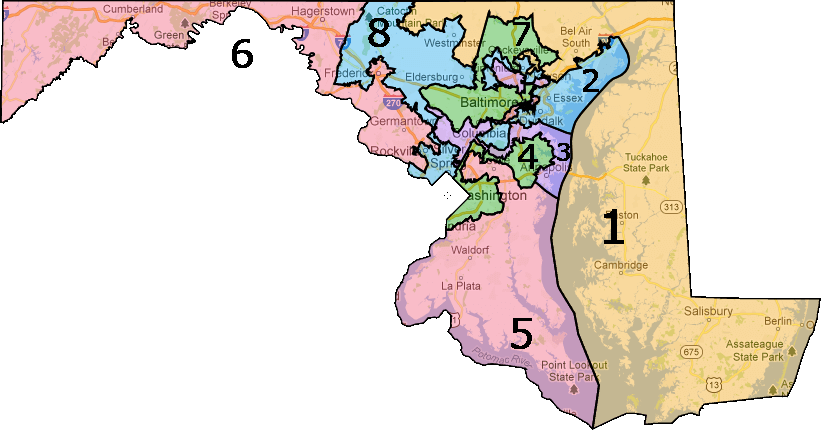Democrats Are Killing Meaningful Gerrymandering Reforms

In a Maryland Matters commentary, Frank DeFilippo accuses Gov. Larry Hogan of “Larrymandering,” gerrymandering Maryland’s congressional districts to benefit Republicans [“Get Ready for Larrymandering,” Dec. 2].
DeFilippo cites not one shred of evidence to support his wild accusations, instead relying on arguments that boil down to “all politicians who can gerrymander do, Governor Hogan can, so therefore he will.” While Maryland has a particularly nasty recent history with gerrymandering, it is patently unfair to tar Gov. Hogan with that brush.
Gov. Hogan has indeed announced an ambitious two-pronged attack against congressional district gerrymandering: he is introducing anti-gerrymandering legislation and creating a bipartisan commission on redistricting. This is the fourth time in four years that Gov. Hogan has submitted an anti-gerrymandering bill (2016 HB 458, 2017 HB 385 and 2018 HB 356) to reform the redistricting process through a commission.
The previous three bills were killed in committee.
Last year, I also submitted an anti-gerrymandering bill (2018 HB 1022) designed to require that congressional districts be drawn under the same restriction our state legislative districts are drawn, compactly and with respect for political and natural boundaries.
My bill, which was supported by the League of Women Voters and Common Cause, nonpartisan grassroots organizations devoted to pro-democracy reform, was also killed in committee. One thing DeFilippo gets right, the Democrats are silent on this. So silent they did not ask a single question during testimony on my bill or the governor’s bill this year. Why? They are the ones meeting in back rooms to kill meaningful gerrymandering reforms.
Gov. Hogan has also created an emergency commission to redraw Maryland’s 6th congressional district, which currently is comprised largely of Western Maryland.
DeFilippo says, “He’s doing it simply to try and pick up another Republican member of Congress.” Well, folks, it’s not that simple.
Most of Maryland is so horribly gerrymandered that The Washington Post averred that Maryland districts are “among the least geographically compact in the nation” and tie North Carolina for being the most gerrymandered in the U.S. Other, more colorful terms for Maryland’s hyper-partisan congressional districts include “blood spatter at a crime scene,” “X-rayed lungs on a Rorschach test” and “smashed spider with broken legs.” The Supreme Court called it a “crazy quilt.” The Supreme Court and The Washington Post, sure, they’re in the governor’s back pocket. Not.
The 6th District in particular is under scrutiny thanks to Benisek v. Lamone. On Nov. 7, 2018, the day after the General Election, a three-judge panel of the U.S. District Court for Maryland issued the landmark Benisek opinion, finding that partisan gerrymandering of the 6th District violated voters’ constitutional rights to representation and political association.
Remarkably, both sides — the state of Maryland and the voters — agreed that the state in 2011 had drawn Maryland’s congressional districts with the overarching dual goals of incumbent protection — keeping the same six Democrats in Congress — and redrawing one of the two Republican districts so that it would elect a Democratic congressperson, and the only question before the court was whether such intentionally drawn partisan districts violated the U.S. Constitution.
Fact after fact recited in Benisek prove that Democratic powers in Annapolis deliberately and openly chose to crack the 6th District, some of which had been an intact district since the late 1800s and had comprised the five most northwestern counties since 1966. Statistically, it was the most Republican in Maryland.
The state moved about 360,000 voters — about half of the voters in the former 6th District — into other districts, so that a net of 66,000 Republican voters, over 30 percent of them, were moved out and replaced with 24,000 Democrats. According to the opinion, this caused “the single greatest alteration of voter makeup in any district in the nation following the 2010 census.” (The results of the 2010 census required redistricting, but only about 10,000 people needed to be shifted from the 6th District to keep the population in each district roughly equal.)
This drastic upheaval, engineered by a computer program used here exclusively to politically gerrymander, was designed to and did unseat Roscoe Bartlett, a Republican congressman representing the 6th District since 1993, who had won and kept his seat by significant margins, replacing him with a Democrat.
Fortunately, the court agreed with the voters, finding that the state specifically targeted 6th District voters who either were registered Republicans or tended to vote Republican, deliberately diminished about those voters’ ability to elect the candidate of their choice by moving them into other districts and that doing so violated their First Amendment rights to representation and free association. Within days of the opinion, Maryland Attorney General Brian Frosh (D) announced his intent to appeal this judgment to the Supreme Court. (While the U.S. District Court is a trial court and appeals from it would usually first go to the 4th Circuit Court of Appeals in Richmond, this appeal goes directly to the U.S. Supreme Court because it was decided by a three-judge panel).
A few days later, after Attorney General Frosh requested a stay, the parties agreed to stay enforcement of the District Court’s order, so that the redrawn maps need not be submitted to the U.S. District Court until the earlier of a decision by the Supreme Court on July 1, 2019.
DeFilippo lauds Frosh’s appeal, but that too is flawed. There is, of course, no guarantee that the Supreme Court will uphold the federal District Court’s decision or otherwise order that Maryland’s congressional districts be re-drawn in time for the 2020 election. Any lawyer can tell you that a case won on summary judgment, granting an injunction and finding specific intent, as Benisek was, is both an amazing work of jurisprudence and vulnerable on appeal, especially given the Supreme Court’s historic reluctance to act in political arenas. There are also the niggling concerns that attorneys, Frosh included, are ethically barred from prosecuting cases they don’t want to win, and that if Frosh wins, Maryland voters lose. In fact, the whole nation may lose.

Del. Michael Malone
Under these circumstances and deadlines, Gov. Hogan has established the nonpartisan commission tasked with redrawing the 6th District by March 4, 2019, followed by a three-week comment period, for finalization and submission to the General Assembly before the end of session in April.
DeFilippo decries the commission as “supposedly sanitized and nonpartisan,” which sounds like a cleaned-up criticism of former Gov. Martin O’Malley’s 2010 five-person commission. That included one Republican, no independents and four clear Democrat political cronies — his appointments secretary, who had no prior redistricting experience, state Senate President Mike Miller, House of Delegates Speaker Mike Busch, and a businessman who chaired his re-election campaign in Prince George’s County and was shortly thereafter convicted in federal court of tax evasion.
Thus far, Gov. Hogan has appointed three of the nine people to his nonpartisan commission: one Democrat, one Republican and one unaffiliated voter. Hardly “Potemkin recruits,” these appointees are highly qualified and very real.
Judge Alex Williams is a Democrat, retired federal district court judge appointed by President Clinton who currently does mediation and arbitration, as well as serving as CEO of the Judge Alexander Williams Jr. Center for Education, Justice and Ethics at the University of Maryland, College Park, which researches and develops solutions for prevailing issues facing underserved communities. He is also a former state’s attorney for Prince George’s County. Walter Olson is a registered Republican and senior fellow at the CATO Institute Center for Constitutional Studies, a libertarian think tank. He is known for his books and blogs on the American legal system. Ashley Oleson is an unaffiliated voter and current administrative director of the League of Women Voters of Maryland. Six more commission members will soon be selected from the public.
DeFilippo also, through obscure references to U.S. Reps. Elijah Cummings (D-Md., 7th) and Anthony Brown (D-Md., 4th) and proceedings back in the 1960s, appears to suggest that redistricting under Gov. Hogan may disadvantage minorities. The court order he refers to is not part of Benisek, but appears to refer to other jurisprudence surrounding racial gerrymandering. Perhaps it should have been. The Benisek opinion points out that the Maryland Legislative Black Caucus proposed a redistricting map in 2010, which was rejected by Democratic leadership.
DeFilippo ends by saying, “[t]here is a self-correcting mechanism inherent in redistricting without all the ju-jitsu exhibitions in executive offices and the courts — win elections and enjoy the spoils. That’s the way God intended it.” That kind of circular argument simply makes no sense. Even the Supreme Court calls out extreme partisan gerrymandering as rigging elections.
Gerrymandering is a thorny problem to solve. So are opioid addiction and gun violence.
It is our job as elected legislators and governors to meaningfully address such problems, not give it up as lost. Maybe DeFilippo is content to let the “noxious cancer on our democracy” that is gerrymandering continue to grow and fester and choke off our democracy. I am not, and neither is Gov. Hogan.
Doing nothing accomplishes exactly that: nothing. We deserve better.
–DEL. MICHAEL MALONE
The writer is a Republican member of the Maryland House of Delegates from Anne Arundel County’s District 33.




 Creative Commons Attribution
Creative Commons Attribution